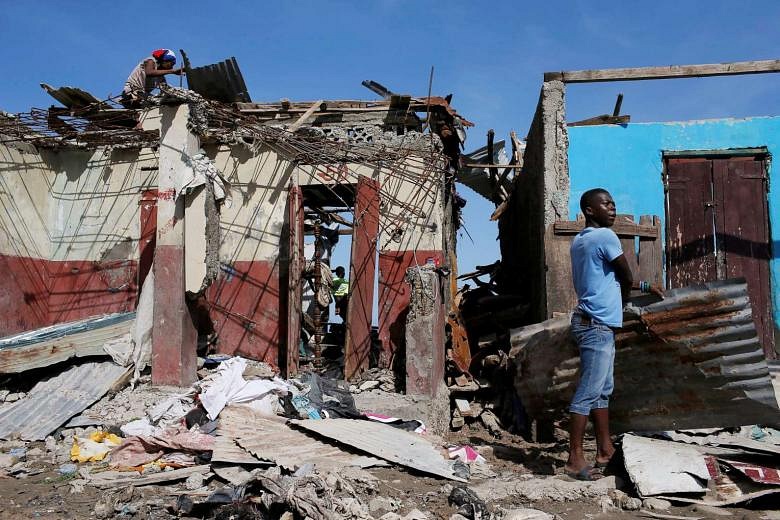WINSTON-SALEM (Reuters) - Emergency crews in boats rescued hundreds of people from floodwaters and plucked others from rooftops by helicopter in North Carolina after former hurricane Matthew flooded much of the US Southeast before weakening on Sunday (Oct 9) and turning out to sea.
Matthew, the most powerful Atlantic storm since 2007, was downgraded to a post-tropical cyclone on Sunday after its rampage through the Caribbean killed nearly 900 people in Haiti and at least 16 people in the United States.
Haiti also has suffered from outbreaks of cholera and about 61,500 displaced people were in shelters, officials said.
In the United States, more than 2 million U.S. homes and business had lost power.
The storm was moving east-northeast out to sea, according to the National Hurricane Center's 11 am (1500 GMT) report, which placed the center of the storm 160 km off the coast of Cape Hatteras, North Carolina.
Although Matthew lost its tropical characteristics, no longer feeding off warm ocean water, the storm still packed dangerous winds with a maximum speed of 75 mph (120 kph), down from 130 mph (210 kph) at full strength.
Storm surges and flooding also remained a threat, the hurricane center said. "There's no way it's coming back (to the coast)," said Dennis Feltgen, a spokesman for the hurricane center.
Officials said many coastal and inland communities were still under water, either from coastal storm surge or overrun rivers and creeks, and dangerous conditions existed from downed power lines and damaged homes.
US President Barack Obama declared a state of emergency in Georgia and Florida, freeing up federal money to help the states repair damaged infrastructure and remove debris. North Carolina and South Carolina also could be in line for aid.
In North Carolina, where at least seven people died, Governor Pat McCrory pleaded for outside help, asking the country not to be too distracted by the U.S. presidential campaign, currently transfixed by a 2005 video of Republican nominee Donald Trump making vulgar comments about women. "I realize political talk is dominating the airwaves on a lot of the other national channels but I want to let the rest of the nation know we need your help," McCrory said.
Florida reported five storm-related deaths, Georgia three and South Carolina one.
Flooding in North Carolina required 877 water rescues, including more than 500 in inland Cumberland County, McCrory said.
The governor said officials were looking for new rescue personnel to relieve the 334 federal, state and local responders who worked through the night "risking their lives." "These rescue teams, I've got to let you know, they are extremely exhausted at this time," McCrory said.
The governor also told of seeing video of the Coast Guard rescuing several people from a roof by helicopter, adding, "I hope that dog survives, too." He reported at least one other helicopter rescue where boats could not reach the home.
In Virginia, where more than 300,000 customers had lost power, the city of Norfolk declared a state of emergency and urged its citizens to remain off the road, while the city of Virginia Beach closed all parks, recreation centers, libraries and the Virginia Aquarium.
The US Federal Emergency Management Agency (FEMA) sounded warnings about flash floods, which Administrator Craig Fugate called the leading cause of weather-related deaths.
Even with the storm moving away from the coast, "an extensive and significant freshwater flood event is unfolding over northeastern South Carolina into central and eastern North Carolina," FEMA said.

